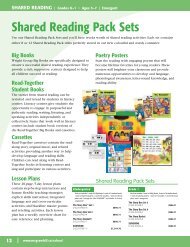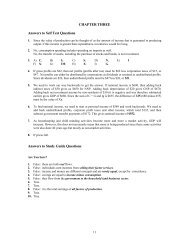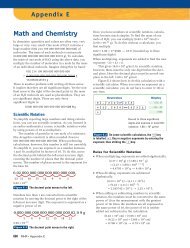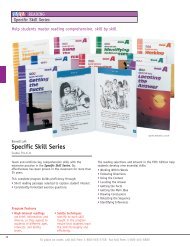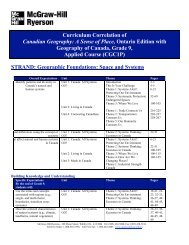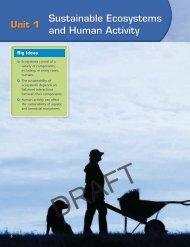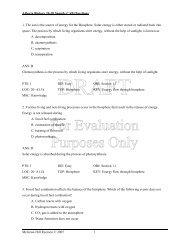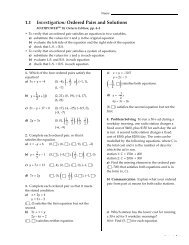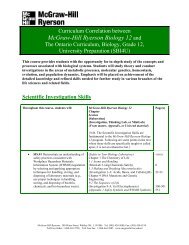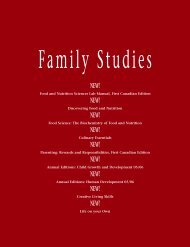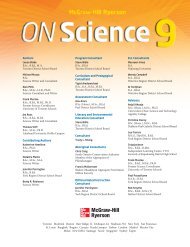2008 McGRAW-HILL RYERSON AnnuAl RepoRt
2008 McGRAW-HILL RYERSON AnnuAl RepoRt
2008 McGRAW-HILL RYERSON AnnuAl RepoRt
- No tags were found...
Create successful ePaper yourself
Turn your PDF publications into a flip-book with our unique Google optimized e-Paper software.
■■adopted this pronouncement in 2007 and the disclosures are inNote 10 of the financial statements.Sections 3862 and 3863 require that a company discloseadditional details of its financial asset and liability categoriesand the risks associated with its financial instruments. Theseaccounting policy changes are for disclosure purposes, and asa result, other than the additional disclosures noted in Note10, the adoption of these standards had no impact on theCompany’s financial statements.The following accounting pronouncements are applicable to annualand interim periods beginning on or after January 1, 2009:Section 3064, “Goodwill and Intangible Assets”, prescribes themeasurement of intangibles, with guidance on the determination ofcosts to capitalize for internally-generated intangibles. The Companyis currently evaluating the effects of adopting this standard.International Financial ReportingStandards (“IFRS”)In February <strong>2008</strong>, the Accounting Standards Board of Canada confirmedJanuary 1, 2011 as the changeover date for Canadian publiclyaccountable enterprises to start using International FinancialReporting Standards as issued by the International AccountingStandards Board. IFRS uses a conceptual framework similar toCanadian GAAP, but there are significant differences in recognition,measurement, and disclosures.As a result, the Company commenced our IFRS conversionproject in <strong>2008</strong> and has developed a plan to convert its financialstatements to IFRS. The Company has assessed the differencesbetween IFRS and the Company’s current accounting policies,as well as the alternatives available on adoption. The assessmentwas reviewed with external advisors and the majorityshareholder. Many of the differences identified are not expectedto have a material impact on reported results and financial position.However, there may be significant changes emanating fromthe IFRS accounting principles and provisions for the first timeadoption of IFRS on certain areas. The Company has not yetdetermined the full effects of adopting IFRS.Set out below are the key areas where changes in accountingpolicies may impact the Company’s financial statements. Thelisting should not be regarded as a complete list of changes thatwill result from transition to IFRS. It is intended only to highlightthose areas we believe to be most significant; however, analysisof potential changes is still in process, and not all decisions havebeen made where choices of accounting policies are available.■■■■■■■■■■Asset impairmentProvisionsDeferred taxesStock-based compensationEmployee BenefitsThe Company is still evaluating the impact of the conversion on ouraccounting systems. However, based on the differences identifiedto date, we believe our present systems can accommodate therequired changes. We believe our internal and disclosure controlprocesses, as currently designed, will not need significant modificationsas a result of our conversion to IFRS. We are consideringthe impact that the transition will have on our compensationarrangements.The IFRS implementation has necessitated additional trainingfor the Company’s accounting staff and management. Thisadditional training will continue in 2009–2010.OTHERThe number of common shares outstanding as of December 31,<strong>2008</strong> is 1,996,638.RISKS AND UNCERTAINTIESEducational Funding Constraints and CurriculumRevisions in the School MarketEducational funding varies from year to year depending on thecurrent government’s budget and mandate in each jurisdiction. Theannual provincial government mandates affect both the fundinglevels and curriculum revision cycles. The funding levels and curriculumrevision cycles have an immediate and ongoing impact onthe performance of the Company’s School Division.Format and Delivery of Future Learning ResourcesChanging media technology continues to affect the publishingindustry in several ways: sales of non-print materials have begunto increase as a percentage of total sales; there has been anincrease in electronic piracy over the internet; and, most importantly,the format of future learning resources continues to evolve.While the Company is working on leveraging the opportunitiesarising from these developments, there can be no assurances thatone or more of these developments will not have a permanent andlong-term impact on markets for the Company’s products.Competition from Foreign-Based Sources(Wholesalers and Online Bookstores)The advent of online bookstores in the U.S. and other countrieshas created an avenue for Canadian consumers and students topurchase published products directly from foreign retailers, thusbypassing the Canadian marketers and distributors of the product.In particular, students are able to access a very large source of second-handproducts. Sustained increases in market penetration byforeign-based virtual bookstores and wholesalers could adverselyimpact the Company’s market share and financial performance.The impact of this issue varies in relation to the volatility in theCanadian dollar/U.S. dollar exchange rates.CopyrightCourt rulings in Canada have reinforced user rights. As media technologycontinues to evolve, publishers may find it more difficultto protect their content effectively. These factors may impact thefuture sales and royalties within the School and Higher Educationindustries from copyright collectives. Royalties are also impactedMcGraw-Hill Ryerson Annual Report <strong>2008</strong>15



